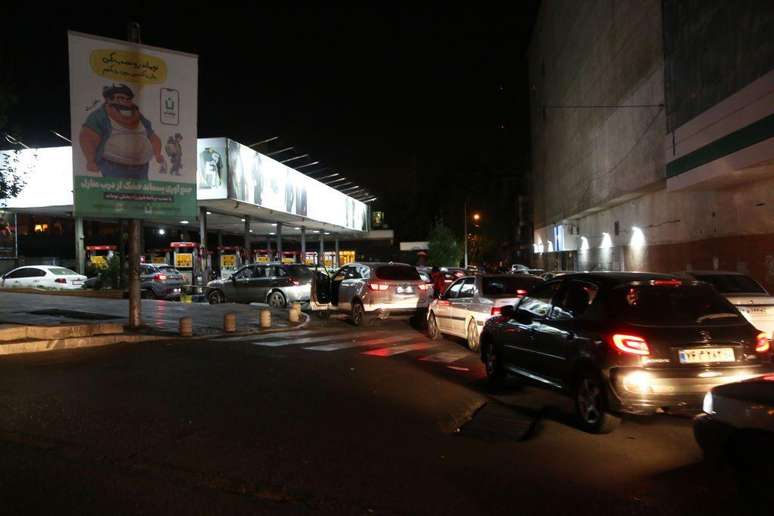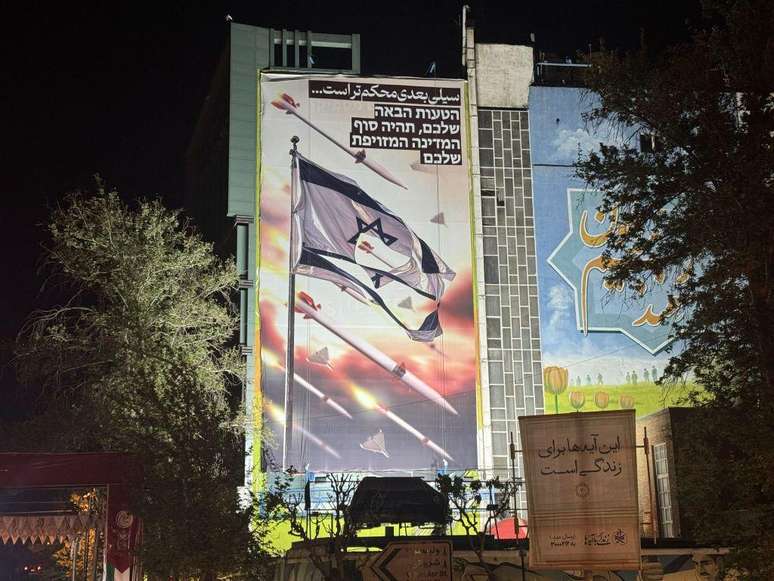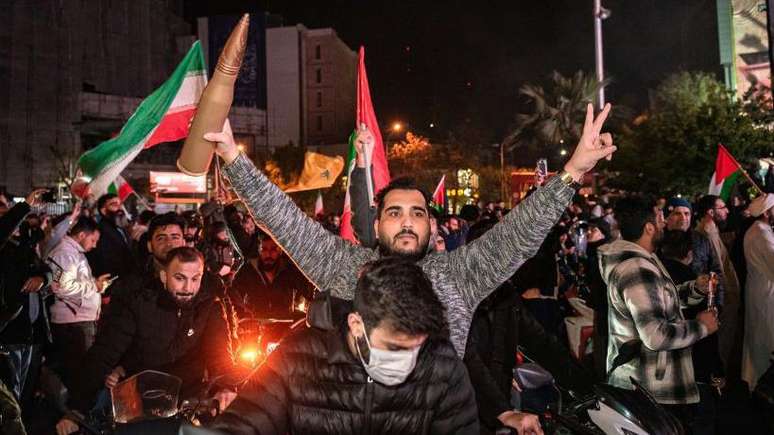After the attack on Israel, Iran seems to want to ease tension, but public concern remains about possible Israeli retaliation.
For the first time in its history, Iran carried out an attack against Israel directly from its territory.
For Iranians, the act was seen as important for the Revolutionary Guard of the Islamic Republic of Iran to maintain its credibility among its allies in the region and its domestic sympathizers. Its goal was to demonstrate Iran’s willingness to address the conflict and the capabilities of its missiles and drones.
The Revolutionary Guard was created 45 years ago to defend the country’s Islamic system and act as a counterweight to the regular armed forces. Since then, it has become an important military, political and economic force within the country and the region.
After the attack on Saturday evening (13/4), many supporters of the Islamic Republic of Iran took to the streets of Tehran to celebrate. Many carried Palestinian symbols.
“I think it was the right decision to attack Israel to prevent further assassinations of Iranian commanders in Syria and elsewhere,” a woman in her 20s who supports the Iranian government said in a voicemail sent to BBC Persian on BBC News in Farsi .
However, many critics argue that the regime does not necessarily represent the views of the entire Iranian population.
“We are not the Islamic Republic, we are the real Iran. The Iranians themselves are at war with the current regime. We hold no grudge against any nation, including Israel,” a 40-year-old man said in a voice message sent to BBC Persian.
Another woman in her 50s said she feared the attack could trigger a regional war by Iran against Israel and its Western allies.
This sentiment resulted in a further decline in the price of the Iranian currency against the US dollar.
Queues and panic in Iran

Iranians now fear retaliation from Israel and its allies after the weekend attack. There was panic among Iranians, with citizens rushing to stock up on food and fuel.
Long queues formed at petrol stations in Tehran and other major cities. The supermarkets were full.
Although Israel claims to have successfully intercepted 99% of the 300 missiles and drones launched against its territory, Iranian authorities have celebrated the attack as a success, underlining its symbolic impact, regardless of the actual casualties caused.
Iranian Chief of Staff Major General Mohammad Bagheri said that among the targets inside Israel was the Israeli Notam air base, from where the Israeli F35 planes flew that caused the death of 7 commanders two weeks ago of the Iranian Revolutionary Guard the Iranian consulate in Damascus.
He also assured that Iran has achieved its objective and has no intention of continuing operations. Iranian President Ebrahim Raisi warned, however, that any new attack would provoke a much stronger response from Iran.

Military and government officials are apparently satisfied with Saturday’s attack, and the atmosphere in Iran is now characterized by reduced tensions.
“Iran never intends to contribute to the repercussions of the conflict in the region, nor to increase or prolong tension,” the Iranian ambassador to the UN said on Sunday (14/4) during an emergency session of the Security Council.
And there are those who argue that Iran, by giving Israel enough time to implement its defensive measures, had no intention of causing greater damage or casualties.
Legitimacy crisis
Many Iranians are against the Iranian Revolutionary Guard’s interventions in the region.
Many Iranians argue that the billions of dollars spent on organizing, training and arming militias abroad could have been used for the country’s development.
Iran’s meddling in the region has led to sanctions and isolation, which has damaged the country’s economy. Inflation is skyrocketing and the Iranian middle class is also increasingly in economic difficulty.
The voices we hear from Iran indicate that the regime does not enjoy the support of the majority of the population, especially in the event of war.
It is a radically different scenario from that seen during the eight-year conflict with Iraq in the 1980s, when millions of young Iranians fervently defended their country against Saddam Hussein’s regime.
A veteran of the Iran-Iraq war has expressed his opposition to the government and its harsh crackdown on critics. “I would never fight for them again,” he said.
The regime’s policies have changed the opinions of even former supporters and significantly altered the political landscape.
Iran has the ability to launch a powerful combination of missile and drone attacks, bolstered by strong support from Shiite militias in Lebanon, Syria and Iraq, as well as the Houthis in Yemen. But it appears that the attack was designed to cause minimal losses to Israel.
In times of war, the Islamic Republic of Iran is not only concerned about the military capabilities of Israel and its ally, the United States, but also about possible internal unrest.
The 2022 protests following the death of Mahsa Amini while in police custody highlighted the regime’s vulnerability.
Many leaders of the Islamic Republic of Iran fear that attacks on the command and communications centers of the Iranian security forces and Revolutionary Guards, in the event of war with Israel and the United States, could reignite protests and embolden opponents of the regime.
Source: Terra
Rose James is a Gossipify movie and series reviewer known for her in-depth analysis and unique perspective on the latest releases. With a background in film studies, she provides engaging and informative reviews, and keeps readers up to date with industry trends and emerging talents.








